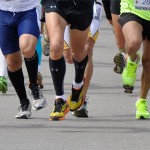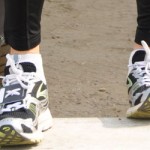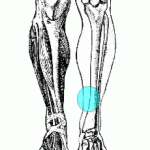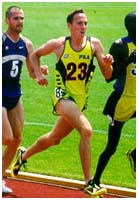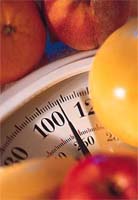In this article I want to discuss the idea that an injury, if it is treated and acted on in the right way, can actually be a gift to runners. Some of you may wonder how one can possibly see an injury as a gift, when being injured can be the most annoying, and sometimes depressing, part of an athlete’s life, so let me explain.
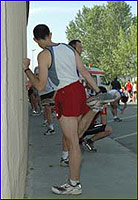 I would never wish an injury on any athlete, especially not what I call a ‘serious accident’ injury such as a bone fracture or ligament rupture. Yet injuries are a reality for most athletes and so it is wise to learn to look at them in a positive way and see them as an opportunity to learn about your body.
I would never wish an injury on any athlete, especially not what I call a ‘serious accident’ injury such as a bone fracture or ligament rupture. Yet injuries are a reality for most athletes and so it is wise to learn to look at them in a positive way and see them as an opportunity to learn about your body.
How on earth can we look at injuries positively? All injuries have causes, but these causes can be many and various: they could be related to the training programme, the athlete’s technique, the athlete’s level of conditioning, the equipment used or the conditions. By identifying the specific causes you can make an objective assessment of what you need to do to ensure the injury does not recur. Then, by working on your weaknesses and making any changes to training or equipment once the injury has healed, you will be a stronger, better prepared athlete who has less chance of getting injured again. This is how injury can be a gift, because it offers an opportunity to discover what you need to work on and a chance to become more aware of your body.
Psychologically it is very important to always look for the positives, even in such stressful times as during an injury. Often young athletes will lose motivation or drop out of a sport when they suffer their first injury; however, the best athletes never allow injuries to get them down. In his biography, Sebastian Coe refers to the stress fracture he suffered at 17 as a blessing in disguise. He claims he benefited from allowing his body to rest and develop naturally and says that it forced him and his father to focus on high-quality training rather than high mileage. These two things, he believed, helped him achieve Olympic gold later in his career.
A sport psychologist, who helps elite athletes through times of injury and illness. recommends making positive action plans to help yourself stay motivated and focused during injury. The plans should include activities to maintain fitness and workouts to develop other fitness areas that do not stress the injury. For example, an athlete with a knee injury could maintain fitness with water running and spend 60 minutes per day working on stretching, dynamic flexibility and core stability. In this way, the athlete can use the time spent out of competition to develop other areas of his conditioning, which will help his performance and prevent future injuries.
A major part of success in sport is learning about your body, how it responds to training and what it needs to develop further. Sometimes being injured gives an athlete an ideal opportunity to reflect on these things and, by absorbing the knowledge of his physiotherapist; he can raise his level of understanding.
Positive injury guidelines
I personally believe that injury can be a gift, but it is up to you yourself to see it that way. If you follow these guidelines, you will always be able to learn something positive from injury.
1. Choose a physiotherapist who can find the causes of your injury and analyse your strength and flexibility as well as simply diagnosing and treating the symptoms;
2. Always follow an active rehab programme to strengthen weak muscles, improve stability skills, work on your posture and stretch tight muscles;
3. Make a plan to maintain fitness and work on aspects of training that don’t stress the injury;
4. Examine your training programme and plan how to improve it in order to increase the specificity and reduce injury risks;
5. Remain positive and see yourself as a more complete, better-conditioned athlete post-injury.
Article by Dave Spence – Resident coach Cape Town
View the articles under the Injury and Treatment section:
- To reduce injury risk, you need to minimise impact
- Injury Treatment Approaches
- Leg & Foot Cramps
- Water Running
- The Gift of an Injury
- Injury prevention tips
- The best predictors of injury
- The Comeback from Injury

















